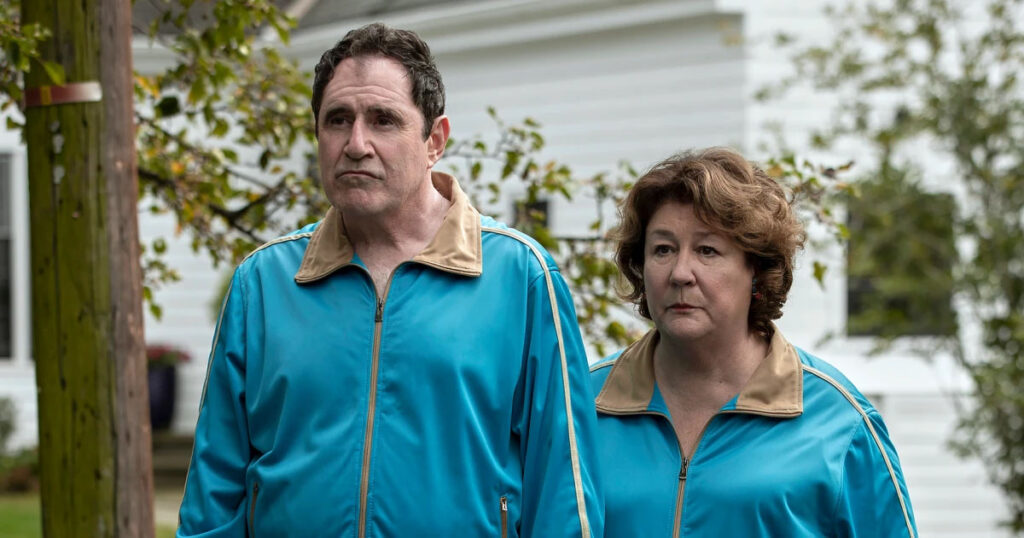The Watcher is more than just a disturbing show. Created by Ian Brennan and Ryan Murphy, the latter famous for shows like American Horror Story and Dahmer – Monster: The Jeffrey Dahmer Story, is inspired by a real-life cold case.
It is based on a 2018 New York Magazine article about a married couple who think they have discovered the ideal home in Westfield, New Jersey, to reside in with their two young children. But when someone who calls themselves The Watcher begins sending them intrusive, eerie letters anonymously, things get mucky.
Fans even swarmed to the real-life property to take pictures when the show initially aired, upsetting the residents. To stop anyone from entering the property, the cops had to tape off the front.

As for the writing, the couple seems fairly naïve and irresponsible in their pursuit of a house out of their financial reach. They can hardly afford to stay there, much less sell it at a loss, which colors their resistance to leave a home that is haunted by spirits or by human evil portrayed throughout the season.
The first season of American Horror Story, if you remember, told the tale of a house where the occupants fought off strange people and crazed tormentors. Murphy has repeated the same plot, recycling the same tensions.
The cast does a good job of enlivening their characters. Although notably underdeveloped, Naomi Watts is great in her role, despite being asked to perform more fascinating work in the genre for the movies The Ring and Funny Games. Her artistic career is not fully developed, and the marital conflict she experiences is only hinted at rather than explicitly demonstrated. When given room to breathe, Cannavale excels in his character’s escalating madness over what his family is going through.
The Brannock family encounters a number of characters, but Jennifer Coolidge, the realtor who sold them their house, and Noma Dumezweni, the detective who is assisting them, had a shaky start but began to stand out later through great depth and richness of writing in their characters. The majority of the remaining characters come off as bland and sometimes even off-putting and out of place.
What remains after discarding the acting and some of the more bizarre choices made to liven up the original material, is a seven-hour mystery centered around a typewriter. Cannavale spends nearly the entire time ranting about envelopes.
The Watcher is a far cry from the innovative, risk-taking originals that Netflix once created out of thin air.
It occasionally has the regrettable air of an ITV drama equivalent to a 2009 horror parody than something adapted from a true story.
The show gives a vibe that any of these characters might theoretically be the villain. A certain character is presented as a potential suspect in an episode, which is afterwards disproven. Each actor gives off unsettling energy, which makes the audience leery of everyone.
Too many issues remain unanswered and the show closes with no concrete resolution. Murphy excels at simultaneously adding new antics to his narrative, but unfortunately fails to follow through to the end. The Watcher will leave you unsatisfied as it offers a potential solution and quickly goes against it throughout its seven episodes.
The outcome is a show that had a promising start, a confusing middle, and an unsolved finale that no one is really happy with. It’s unfortunate. since like most of Murphy’s productions, The Watcher too had the potential to be both genuinely entertaining and memorable. Instead, it became another Ryan Murphy production that failed to wow viewers, joining Hollywood, Ratched, and Halston.
There are a few intriguing themes, but for the most part, The Watcher, appears to throw a lot of ideas, giving little thought to whether anything holistically makes sense. It’s challenging to stretch out a mystery with a very straightforward plot for almost seven hours of material. The final moments were excruciatingly painful to watch. I was eager for the show to end by the time I got to the final episode. A compelling narrative had been reduced to simply another drama lifted straight from the headlines in an infinite sea of content, neither good enough to rise to the top nor awful enough to sink to the bottom.